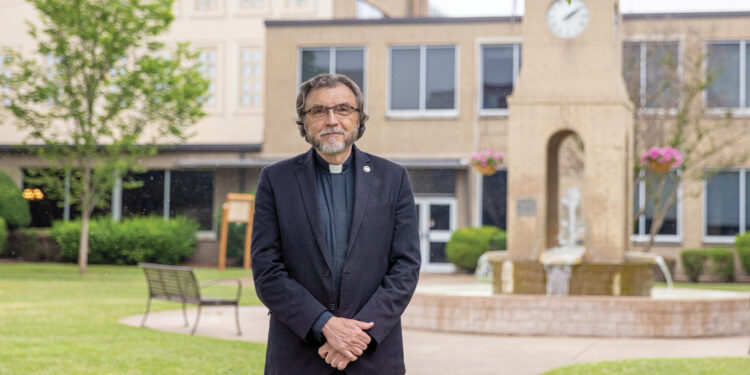Brescia University
Father Larry Hostetter began teaching at Brescia University in 1999. He spent eight years teaching theology and philosophy before taking the helm of the university.
As president, Hostetter said that the university has been a culture of change but that is where it is actually rooted. Brescia is a Catholic, liberal arts institution founded because of the community’s need for soldiers returning from war with the GI benefits that provided educational assistance. Mount St. Joseph had a junior college for women in Maple Mount and the co-educational campus began in 1949 at its present site. Soon after, it began as a four-year college.
“Throughout our history, you can find these adaptations,” he said.
In the 2007-08 school year, Brescia began offering online degrees, the first of its kind. The social work program took off quickly, and since then, Brescia has expanded the online offerings in both Bachelor’s and Master’s programs as well as hybrid programming.
This, Hostetter said, is what is known as “The Brescia difference.”
“At one time, we had a student from every state in our online degree program,” he said.
The latest strategic plan for the university is rooted in the university’s Catholic roots and follows Caritas theology, which ties into the social work curriculum.
“Caritas is Latin for love and the effort to find meaning in this call to love is this theology,” Hostetter said.
Taking passages from the Gospel of John where Jesus says “Love one another as I have loved you,” Hostetter said that while it is fantastic to have an education and build a life, it needs to be rooted in love.
“To take it, share it and pass it on,” he said.
Beginning when students enter the university, each student is seen as uniquely made and not repeated. So, educational plans also follow this philosophy and are not “cookie cutter” by design. The first part of the planning is universal design.
“We make sure that when [they are] in class or participate in anything, students know that when challenged, that is built into the curriculum and that we are accessible,” he said.
In the second part of the strategic plan, the university helps build the best person each can be.
“We do this by living in a community and doing it in an authentic way…and being the best person when we are in that community,” he said.
The implementation of these strategies was difficult to fulfill in the pandemic with the restrictions, but things are coming back to a semi-normal state, he said, but everyone – from staff to students – has to have buy-in and be part of it.
“Once we have understanding then we have a role to help all succeed,” he said.
Hostetter finds time to be seen on campus and interact with students informally in the quad. He also participates in serving in a soup kitchen with others from Brescia each Friday night.
“This is one of the highlights for me – they get to see all of us involved,” he said. “We find ways to demonstrate Caritas and do our best to treat others with the respect they deserve.”
He believes that their athletics program, which includes over 10 sports, is another example of learning to live in a community.
In the last couple of years, Hostetter said that they are looking at workforce development and they are working to meet those online and create modules for it. Brescia is also trying to meet the need for mental health services. They are starting with staff and also using it for students, which is cohesive with the Caritas theology.
“I love the job, I love what I am doing,” he said. “There are challenging times, no doubt, and things are changing in ways not expected, and that takes quick thinking.”










